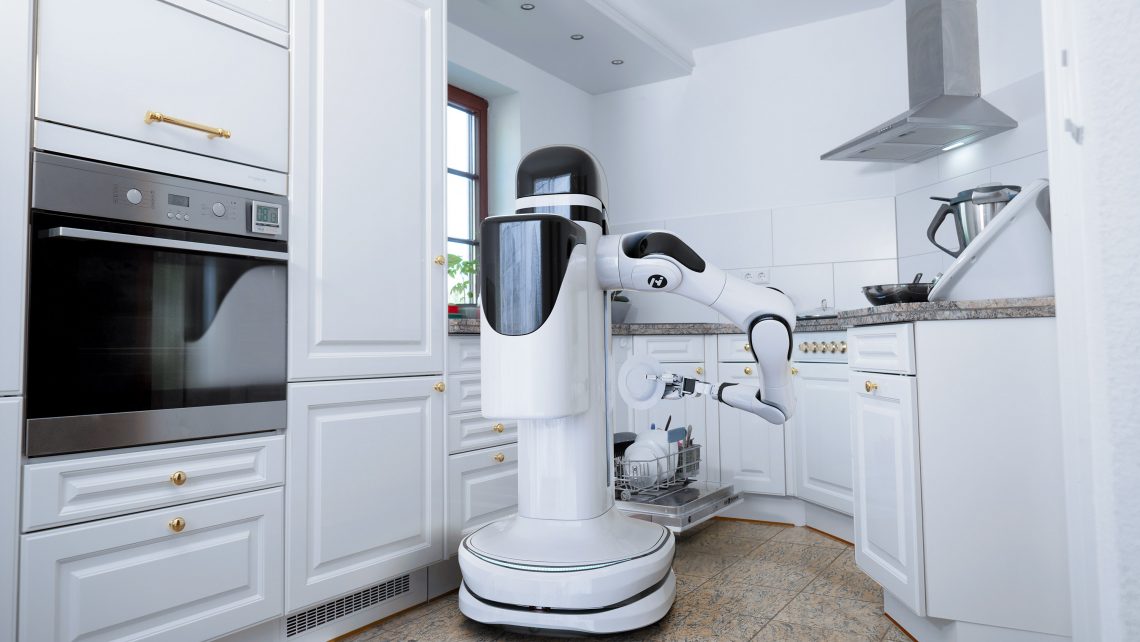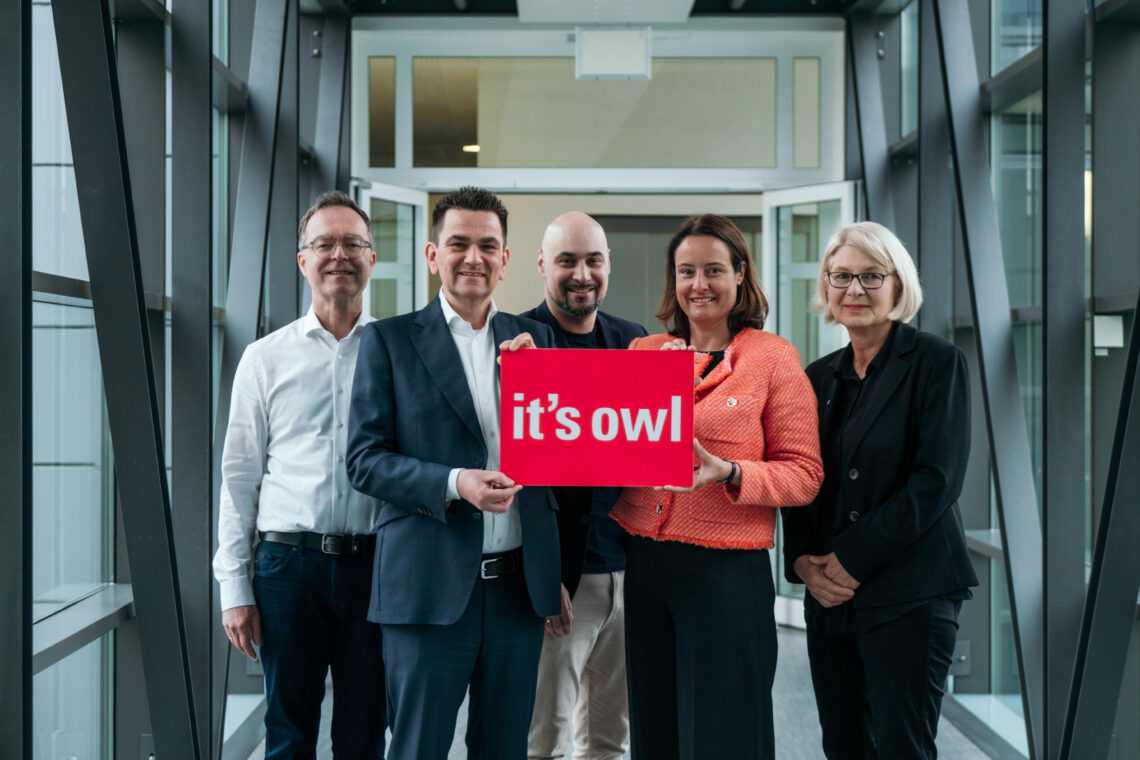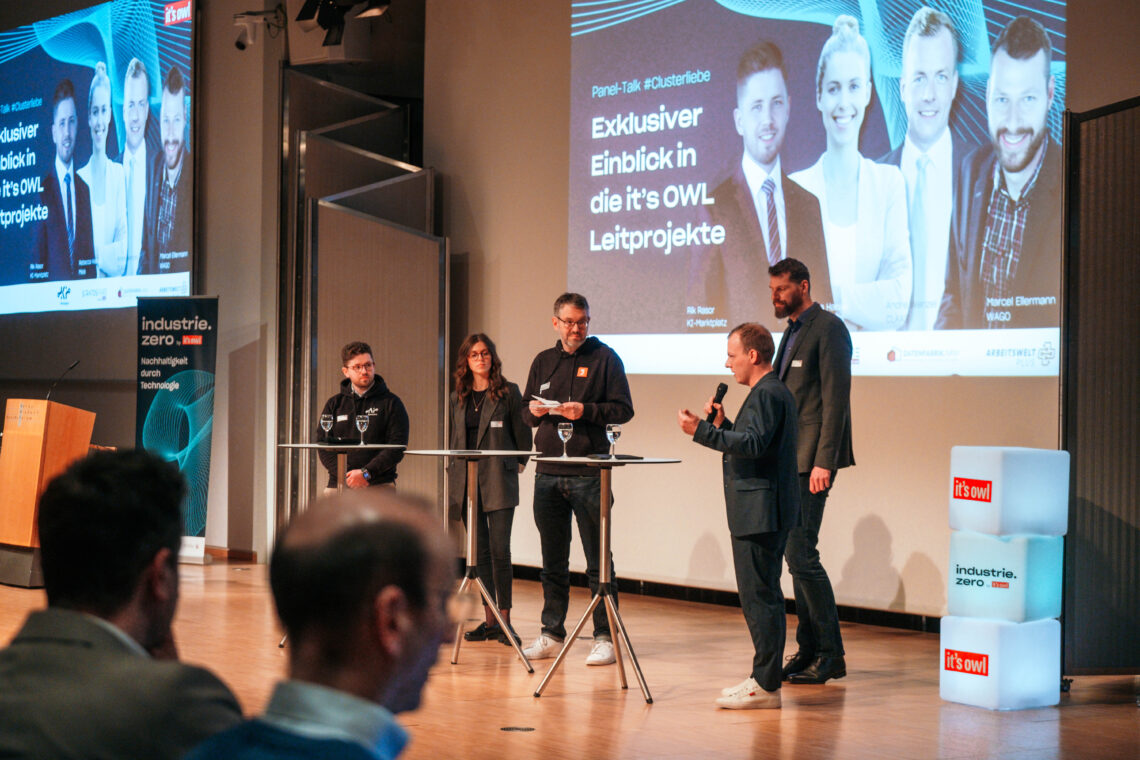
Six new projects for the Leading-Edge Cluster it’s OWL
Sustainability in companies, a robot for the kitchen and the safety of machines: In six new innovation projects of the Leading-Edge Cluster it’s OWL, 18 companies and five research institutions are jointly developing approaches and solutions to tackle specific challenges in industry. 13 projects took part in a tender organised by the state of North Rhine-Westphalia for the further development of the leading-edge cluster it’s OWL. Six of these were selected by an independent panel of experts. The projects, which will start in April 2023, have a total volume of 15.6 million euros. The state of North Rhine-Westphalia plans to support the projects with funding totalling up to 9.3 million euros.
Mona Neubaur, Minister of Economic Affairs and Climate Protection of the State of North Rhine-Westphalia: “With the new innovation projects, it’s OWL is providing important impetus for the competitiveness of industry in Ostwestfalen-Lippe and the whole of North Rhine-Westphalia. The leading-edge cluster is thus setting standards for technological progress and bringing companies and science together to develop the right solutions for sustainable and digital business from innovative ideas. This is an impressive demonstration of what the climate-friendly transformation of industry looks like when we cleverly combine existing expertise and potential in our state. This pioneering spirit, which is exemplified here, is exactly what we need to master the current challenges.” For it’s OWL Managing Director Günter Korder, the six new projects are important building blocks for implementing the new strategy of the leading-edge cluster and developing OstWestfalenLippe into a model region for sustainable value creation. “With our latest projects, we are demonstrating that digital solutions will be the key to sustainability. Our aim is to help the economy to achieve zero emissions and for it’s OWL to be recognised not only as an important initiative for Industry 4.0, but also for Industry Zero in the future.”
One-armed robot assists in the kitchen
Robot vacuum cleaners and smart speakers are already established in many households, but how can a robot provide support in the kitchen? The project “Human-robot collaboration in the kitchen of the future” is looking at the development of a service robot that loads and unloads the dishwasher. Together with the companies Miele, Hettich and Neura Robotics GmbH, Bielefeld University is working out which tidying concepts need to be rethought and which sensors and requirements the kitchen and the robot need to be equipped with. The kitchen should not be customised for the robot, but should be equally usable for humans and robots. Two mobile, one-armed robots are being compared in the project.
Sustainability in engineering
There is often a lack of suitable methods to support developers in the design of sustainable systems. Should an electric motor be encapsulated to minimise heat loss, or should the motor not be encapsulated so that it is easier to recycle later? Which solution saves the most CO2? The “Sustainable Lifecycle Engineering” project aims to enable developers and product managers to incorporate sustainability aspects into their decision-making at an early stage of engineering. The methods are based on existing approaches and methods of model-based systems engineering (MBSE). The models are extended to include sustainability aspects and requirements. Project partners are: Diebold Nixdorf, Fraunhofer IEM, Fresenius Medical Care, Harting, Miele, Two Pillars, University of Paderborn, Wago, Wuppertal Institute.
Tackling dual transformation the right way
The “Strategic Management of Dual Transformation” project is looking at how sustainability and digitalisation can lead to corporate success. Whether materials, working conditions or recycling: value chains have great potential for companies to become more sustainable. Due to the complexity of value chains, management is required. The project team is working out the best way to structure and organise this management. In individual projects, the companies Böllhoff, Hanning, Schmitz Cargobull and Weidmüller are supported in the dual transformation of their companies by the Fraunhofer IEM, InnoZent OWL, Paderborn University and the Wuppertal Institute.
Making IoT systems safer
Thanks to the Internet of Things, smart household appliances can be controlled and machines in companies can communicate with each other. The networking of systems requires high security standards such as regular updates, data encryption, threat analysis and the detection of attacks by attack detection systems. The project “IoT security through cyclical, precisely interlinked threat analysis and attack detection” focuses on facilitating the development and maintenance of secure IoT systems for companies. The researchers at Fraunhofer IEM are working on Miele’s networked vacuum robots and the security of Diebold Nixdorf’s ATMs, among other things. A catalogue of protection mechanisms is to be drawn up for threats to these devices. Countermeasures to threats are to be incorporated into the life cycle as internal security requirements for hardware, software and processes.
Optimising product management with data
What do companies need to do to ensure that their products continue to be successful in the future? Product management deals with this question. The experts take care of the planning, management and control of their company’s products or services. They often rely on their gut feeling, as relevant data is usually scattered across different departments. The “Data-based product management” project is working on how product management can be improved on the basis of data. In the project, the companies Böllhoff, Diebold Nixdorf, DMG Mori, Isringhausen and Schmitz Cargobull are to be instructed on how to carry out classic product management tasks, such as planning new product features, more objectively and successfully by using modern data analysis. Data from various sources such as operating data, internal data from marketing and sales as well as external data from social media, for example, will be utilised. The companies are supported by the research partners Fraunhofer IEM and Heinz Nixdorf Institute.
Software supports plant safety
In companies, it is not only the security of office IT that is important, but also the security of production facilities. A risk assessment is necessary in order to assess the security of systems. However, like the certification of security standards, this is usually carried out manually and is therefore time-consuming and cost-intensive. The project “Software-based support of security risk assessments in industry” is working on software-based support for risk assessment and the certification of components. Through increased automation, the project promises to relieve the burden on specialists in routine tasks and speed up decision-making with regard to security. Weidmüller, Comma Soft and rt-solutions are working together with TH OWL on the project.








